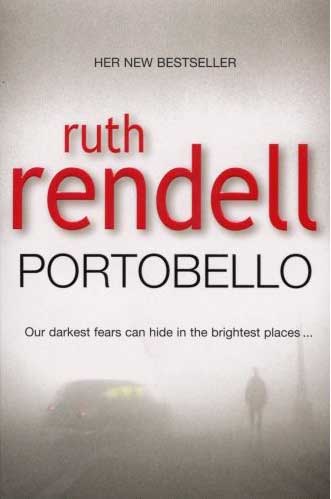
EURO CRIME
Reviews

Rendell, Ruth - 'Portobello'
Hardback: 288 pages (Nov. 2008) Publisher: Hutchinson ISBN: 0091925843
With PORTOBELLO, Rendell progresses her London obsession to new lengths: for years it's been obvious that Rendell loves the city and it's different corners, each with its own atmosphere, character and characters, and here, her mission is clear even from the very title: this is a book about Portobello. Which is absolutely fair enough, as atmosphere and character are two of the things Rendell are best at. In neither department does she disappoint here, either.
One day Eugene Wren, owner of an art-gallery near the Portobello Road, finds a sum of money in the road near his house. Instead of handing it in to the police, he finds it easier to stick a note on a lamppost requesting that anyone who has lost a sum of money slightly above or below that which he has found (to wheedle out false claimants) contact him to retrieve it. It's this act that brings the lives of several different people - some harmless, some troubled, some malicious, some foolish - into orbit with one another, with sometimes devastating results. But whose lives, exactly, will be negatively touched? And who'll escape the bustle of Portobello's underbelly unscathed?
Rendell's London manifesto is well-served here: PORTOBELLO lives and breathes, and in terms of the novels she's written about the city (from the Regent's Park-set THE KEYS TO THE STREET, or the Rillington Place area of THIRTEEN STEPS DOWN), PORTOBELLO is by far the jewel in the crown, the most evocative of them all. The atmosphere of the place is rendered superbly, and it feels almost like a foreign country, an eccentric bazaar rich in both wares and people, full of contrasts in class, naivety, vice and wealth. Indeed, the passages in which her brief is simply to describe the area, her writing is as good as it always is when portraying her characters and their hidden little defects, deficits and desires. Which, of course, are plentiful here: Eugene Wren is elderly but eccentric, obsessively secretive and more than a little obsessive-compulsive about petty things. Joel Roseman, the fascinating young man who is the genuine loser of the cash, and who harbours a dark secret in his past, is haunted by an angel he believes came back with him after a near-death experience. He sits in a darkened apartment day and night, wearing dark glasses, and believes the angel talks to him unseen in shadowy corners. And there's Gilbert, an ex-thief who's taken refuge in his new belief in God, and who holds prayer-meetings for his church in a run-down, shabby house. These are all fine Rendell examples, all of whom become tangled up variously in each other's lives: the tension, as always, comes from the thorny problem of how exactly they will collide.
Despite its quota of arson, burglary and murder, PORTOBELLO is actually a rather quieter affair than usual from the Rendell pen. Violent events happen, indeed, and shock they do, but they come woven much more into the finer tapestry of Portobello life than they would in any other of her novels. They are simultaneously at the forefront and background. They force their way through into people's lives as they would otherwise normally go about their business. They have their effects on the few but not the many, even among the characters concerned. The novel is much more a sustained ensemble piece than many of her books, a constant almost-climax. The fact that this might become wearing is one of the only criticisms of the novel I can think of, and even that is tempered by the fact that it's one of her shortest novels in some time. And, as it's one of her shortest for a while, it's also her most abundant. PORTOBELLO's a rich feast of everything you might read her for.
In the end, the final note she plays is major rather than minor. She steers away from the ironic, cynical endings of her past two stand-alones, and instead provides what is almost a happy ending. Which is an almost Rendellesquely unexpected twist in itself.
Finally, as with so many of her books, PORTOBELLO's major secondary theme is obsession and addiction: Eugene has a shameful addiction all the more ludicrous for its banality; Joel is addicted to the dark, his father addicted to an event in the past; Lance is addicted to a girl, and his Uncle Gilbert seems addicted to his church. And, thank heaven, then -as it's produced some of the finest, most sinister pictures of the city in 20th century fiction - for Rendell's addiction to London.
Fiona Walker, England
December 2008
Details of the author's other books with links to reviews can be found on the Books page.
More European crime fiction reviews can be found on the Reviews page.